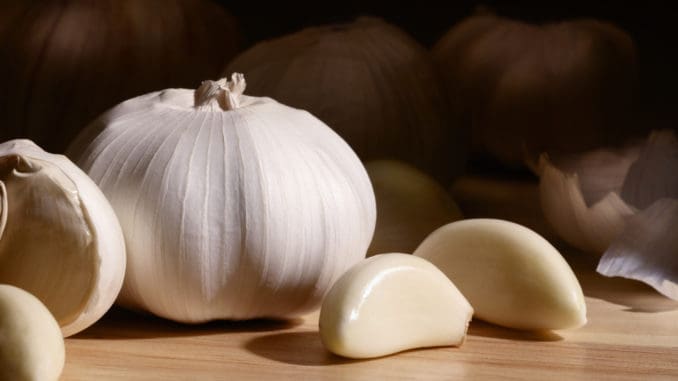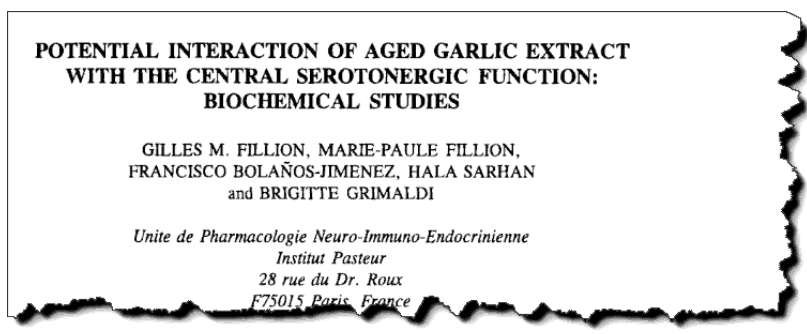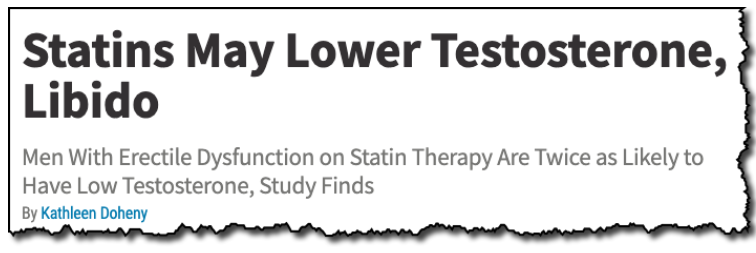
[cmamad id=”22885″ align=”center” tabid=”display-desktop” mobid=”display-desktop” stg=””]
Here are the shocking results from Dr. Bob Beck’s 1970s case study on the effects of garlic… (This has been covered up for decades…)
—-Important Message—-
What a drug smuggler taught me about growing a bigger penis
Thanks to a tennis-playing drug smuggler from Colombia… with the biggest penis I’ve ever seen…
I’ve discovered a natural secret to growing your penis a little bigger and thicker…
It’s 100% natural – no drugs from this drug smuggler.
And while it won’t turn a cornichon into a big dill pickle, this natural secret WILL increase the size and thickness of your penis to full capacity.
———-
Garlic – good or bad for men?
Most health claims concerning garlic are quite positive.
Garlic reliably reduces platelet coagulation, inhibits cyclooxygenase, kills bacteria, is an antioxidant, and even “lowers cholesterol”…
(Lowering cholesterol is not necessarily something to worry about, but we think of it as good.)
Yet, surprise, garlic also has a few effects that can be considered negative…
They could be seen as “side effects” acting in opposition to the effects we want from garlic: killing bacteria, reducing stroke, or simply for flavor.
Garlic is a suspected serotonergic agent, at least when eaten raw. And two separate studies show this.
Similar to garlic’s ability to lower cholesterol synthesis, its serotonergic activity is generally projected in a good light.
Yet this view has more to do with pharmaceutical profits than with reason…
There are many good reasons to avoid excessive serotonergic activity.
The pro-serotonergic bias of scientists is rampant.
This is likely because so many pharmaceutically-funded studies been published…
And also because an overly-optimistic view is more conducive for receiving pharmaceutical grants.
That is to say: Scientists appear to solicit funding somewhat indirectly – as innuendo – by writing in an approbative tone that is agreeable to pharmaceutical companies.
Yet independent scientists aren’t so laudatory about serotonin…
And for good reason…
While too little serotonin is certainly associated with depression, too much is associated with plain old stupidity.
“Augmentation of 5-HT [serotonin] neurotransmission has been shown to impair human vigilance performance, i.e. the ability to remain alert for prolonged periods of time…”
Serotonin has a U-shaped curved demarking a fine line between depression on one end, through emotional poise, and towards idiocy at the other extreme.
Although it can be somewhat enjoyable to be happy for no good reason, too much serotonin can turn someone into a basket case.
[cmamad id=”22886″ align=”center” tabid=”display-desktop” mobid=”display-desktop” stg=””]
For example, over-activating the serotonergic system willy-nilly isn’t particularly desirable for:
(1) People going to school
(2) Those who have children going to school
(3) People involved in legal disputes
(4) People who need to concentrate for any reason at all
So it’s certainly worth knowing which foods can influence the brain in this way…
And that’s not so obvious to figure out.
Exactly which foods make a person think unclearly can evade detection by doing just that…
Especially if they also make a person feel “happy” by hyperactivating the serotonergic system.
“In fact, there is some indication that some attentional functions – selective attention and memory-related executive functions, strategy-driven retrieval from semantic memory – may benefit from a reduction of 5-HT neurotransmission.”
Garlic appears to be one of those serotonergic agents…
And maybe that’s why it’s been historically avoided by Chinese monks, Taoists, and Zen masters.
The exact reason for garlic avoidance is often disregarded as “quaint Ayurvedic bullsh*t” by people who feel the need to categorize all foods in a polar, black & white manner.
Yet both foods and drugs can certainly have disparate effects – some that can be seen as “good” and some that can be seen as “bad.”
Garlic has such a wide spectrum of effects that it refuses to conform to a simplistic classification.
So, even though it’s useful in certain circumstances, and tastes absolutely great, we need to know its side effects to help determine its appropriate use:

Around 2003, a group of French biochemists tested aged garlic extract (AGE) against an entire panel of neurotransmitter receptors.
They found that garlic extract interacts with only one receptor, the serotonin receptor 5-HT1B
And it potentiated that one at the lowest concentrations tested.
Scientists believe that the 5-HT1B receptor inhibits the release of dopamine in the frontal cortex…
And maybe that explains one manner in which serotonin inhibits vigilance and focused attention.
“Moreover, the binding of serotonin [3H]5-hydroxytryptophan to [serotonin receptors] was specifically enhanced in a non-competitive manner.”
Dr. Bob Beck is perhaps the only modern scientist who spoke in the past about a negative effect of garlic on the mind.
While occupied in the manufacturing of electroencephalograph machines in the 1970s, Dr. Beck had found a correlation between garlic ingestion and low EEG recordings.
Yet there is little published science on these effects…
Most articles dealing with garlic and behavior are ambiguous rat studies.
It’s not uncommon these days to attribute a “pro-memory” function to a compound simply on the basis of electroshock avoidance trials in rodents.
Obviously, such trials are highly open to interpretation…
Judging by the methods used, it would be just as appropriate to call purported “’pro-memory effects” actually “rat modesty effects.” And perhaps graph them on a “timid scale.”
A rodent with a less exploratory attitude may be assumed to “learn” faster than a curious one, simply on the basis of being more comfortable in captivity.
Since there isn’t that much data to go on in terms of human studies, individuals must rely a bit more on personal experience than with some other things.
Perhaps the most reliable way to gauge garlic’s effects on your mind would be to avoid it entirely for a few days, and then try a dose of two cloves.
“It was interesting to note that the binding of [3H]5-hydroxytryptophan in the presence of 8-OH-DPAT and mesulergine, that mainly corresponds to 5-HT1B receptors, was significantly enhanced in the presence of the lowest concentrations of AGE tested in these assays.”
(That’s just another way of saying it looks like even the lowest concentration of aged garlic extract bumps up the activity of serotonin.)
Garlic compounds are small, lipophilic, and neutral, and are hence widely assumed to penetrate the blood-brain barrier.
Garlic extract potentiated the 5-HT1B receptor over 250% in the concentration range of 10–20 μg/mL (μg = microgram).
So the concentration mentioned above corresponds to 10–20 parts per million (ppm) – very small.
This was an extract of the whole herb, and each chemical constituent would necessarily be present in even lower concentrations.
By way of comparison: In rats, a major garlic compound (diallyl disulfide) yielded plasma concentrations of the main metabolite (allyl mercaptan) of nearly 100 ppm.
This was at a dose of 200 μg per kg of body weight per day.
If extrapolated to an adult human weighing in at 70 kilograms (155 lb), this would equate to 14 grams per day.

Your average garlic clove weighs anywhere from 4 to 16 grams, depending on size.
Now, garlic is not pure diallyl disulfide.
But the plasma concentration resulting from ingesting 14 gm of diallyl disulfide a day is 5 to 10 times greater than needed to potentiate 5-HT1B receptors by over 250%.
This alone isn’t enough to explain the mental effects of garlic, long-noted by keen observers.
But there is evidence of other mechanisms of serotonergic activity:

Using an ethanolic garlic extract and dozens of Swiss albino mice, a team of Indian scientists tested garlic – along with four pharmaceuticals – for “antidepressant” activity.
Foregoing the absurd use of a forced-swim test on mice to determine “antidepressant activity,” this study actually yielded some important data:
“Garlic extract significantly decreased immobility time in a dose-dependent manner…indicating significant antidepressant-like activity.”
They found a very substantial reduction in monoamine oxidase-A (an enzyme) activity in the brains of mice fed garlic extract…
And that was at only at 100 mg/kg of body weight per day.
This would be only 7 gm per 70 kg in a human, approximating the weight of a medium-to-large garlic clove.
Monoamine oxidase-A (MAO-A) is the isoform responsible for converting serotonin into 5-hydroxyindole acetic acid.
(That is an inert and water-soluble metabolite readily excreted in the urine.)
Low activity of this enzyme translates into higher brain concentrations of serotonin.
Modest doses of garlic extract – only 100 mg/kg per day for mice – lowered MAO-A by 64%:

A corresponding increase in brain serotonin would be a foregone conclusion.
So in addition to aged garlic extract acting directly on 5-HT1B receptors, ethanolic garlic extract can substantially lower monoamine oxidase activity.
These two effects could synergize: Garlic appears capable of both increasing serotonin and potentiating its response.
Yet garlic is not physically dangerous at these dose levels… And it tastes good…
So doing your own bioassay at home is a relatively straightforward process.
Personally, I think I can feel an effect from garlic now that I’ve been on the lookout for it.
“Garlic extract (100 mg/kg) administered to mice for 14 successive days, significantly decreased brain MAO-A and MAO-B activity, as compared to the control group. MAO inhibition was comparable to [the anti-depressant] imipramine.”
So although garlic is an effective antioxidant, antibiotic, antifungal, antifibrotic, antilipidemic, etc., it could very well also act as an antidepressant.
And, although its antidepressant effects would generally be seen as a good thing by most people, there are circumstances where it should be avoided.
Serotonin makes people happy at the expense of focused attention. And that is certainly a liability in certain occupations and activities.
Yet it is possible to be happy by other means, ones that don’t involve artificially increasing serotonin.
“In fact, some findings suggest that overstimulation of the 5-HT system actually induces memory impairment.”
—-Important Message—-
Factor C2T naturally converts cholesterol into testosterone – so your cholesterol FALLS and your testosterone RISES.
Statins are one of the worst Big Pharma treatments on the market.
Statins lower men’s testosterone levels and libido, and kill erections:

And I’ve discovered Factor C2T, which converts cholesterol into testosterone in a man’s testicles… This is a totally natural method.
So it makes your cholesterol turn into testosterone.
So your cholesterol drops to a safe level.
And, you are feeling really confident and assertive. You are now building muscles even if you barely work out.
And you are feeling more pleasure when you have sex.
———-

- Fillion, Gilles. "Potential Interaction of Aged Garlic Extract with the Central Serotonergic Function: Biochemical Studies." Nutraceuticals: Designer Foods III–Garlic, Soy and Licorice (2004) https://books.google.com/books?hl=en&lr=&id=-2cnNsg-hfkC&oi=fnd&pg=PA189&dq=garlic+serotonin&ots=Dx9ua0dqNU&sig=6YQquMsjslovwvFaBBXDHod4170#v=onepage&q&f=false
- Germain, Emmanuelle. "In vivo metabolism of diallyl disulphide in the rat: identification of two new metabolites." Xenobiotica (2002) http://tandfonline.com/doi/abs/10.1080/0049825021000017902
- Schmitt, J.A. "Serotonin and human cognitive performance." Current pharmaceutical design (2006) https://www.researchgate.net/profile/Wim_Riedel2/publication/6943885_Serotonin_and_Human_Cognitive_Performance/links/55f2c28608ae0960a389786b.pdf
- Dhingra, Dinesh. "Evidences for the involvement of monoaminergic and GABAergic systems in antidepressant-like activity of garlic extract in mice." Indian journal of pharmacology (2008) https://pdfs.semanticscholar.org/b267/0a1a9b52f5c3ef6cd3e73b1757f1211f30aa.pdf
- Garlic: a review of potential therapeutic effects - NCBI https://www.ncbi.nlm.nih.gov/pmc/articles/PMC4103721/
- Garlic | Linus Pauling Institute | Oregon State University https://lpi.oregonstate.edu/mic/food-beverages/garlic
